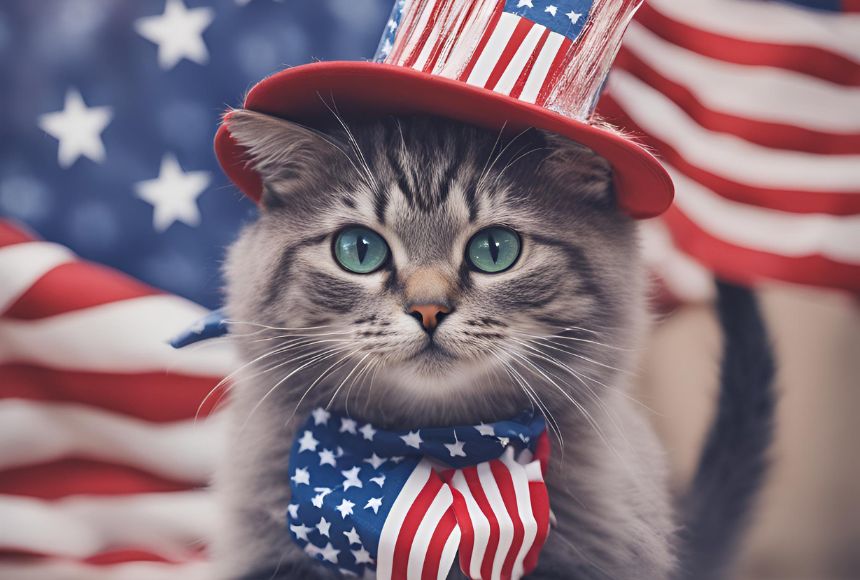Happy 4th of July from us to you!
Fireworks, picnics and other Fourth of July traditions can be great fun for people. But all of the festivities can be frightening and even dangerous for animals. Noisy fireworks and other celebrations can startle animals and cause them to run away; holiday foods can be unhealthy; summer heat and travel can be dangerous; and potentially dangerous debris can end up lying on the ground where pets can eat or play with it.
Whether or not you’re planning your own Independence Day celebration, it’s important to take precautions to keep your pets safe both during and after Fourth of July festivities.
How to prepare in advance:
- Microchip Identification – Be sure your pet has a microchip AND that it is registered to you. In the case your pet escapes, you want to be able to have a way for them to be “linked” or traced back to you. Upon implantation or adoption you would have been provided with a 15 Digit ISO Microchip Number OR a 9 Digit AVID Microchip Number that you would have needed to register. If you are unsure if your pet is currently microchipped, you may bring them to any vet hospital for a quick scan – if they are not we’d be happy to microchip them for you!
- Sedatives/Anxiety Medication – If your pet tends to be overly anxious, talk to your veterinarian about sedatives. Oral medication can help reduce the stress and anxiety, and hopefully decrease the chances of escaping. Not all pets qualify for oral sedatives. Remember to allow 5-7 days for your veterinarian to prescribe and fill medication – so reach out to them now!
- Safe and Secure Environment – Create a space in your home that is sheltered from noise and bright lights. Make sure all windows are secure, and that there are no escape routes for your pet. Keep your pet comfortable by closing blinds, covering their crate and playing calming sounds. Ensure your yard is secure (ie. fix any broken gates, screen doors, holder under fences) in the case neighbors set fireworks off unexpectedly. Update the name tag on your pets collar, for outdoor kitties be sure they have a breakaway collor (in the case of escape and a collar getting snagged on something).

TAKE THE FEAR OUT OF FIREWORKS!
Here are a few tips to keep your pets safe this Independence Day:
- Get a big workout in – Take your dog for a longer walk than normal or play with your cat for a long period of time to wear them out
- Divert their attention – give them a new bone or toy to play with
- Drown the noise out and Provide a safe space – give them a place (such as a crate, closet or closed bedroom) that is cool with AC so they can feel safe, close the blinds and turn on the TV or relaxing music
- Leave your pets at home when you go to parties, fireworks displays, parades and other gatherings. Loud fireworks, unfamiliar places and crowds can all be very frightening to pets, and there’s great risk of pets becoming spooked and running away.
- Avoid the urge to feed your pets table scraps or other foods intended for people. Be especially careful to keep them away from these common foods that are actually toxic;
- Xylitol-containing products (xylitol is an artificial sweetener often found in sugar-free candy and gum);
- Chocolate (although some types of chocolate are not as toxic as others, it’s safer to keep your pet away from all types of chocolate);
- Onions;
- Grapes and raisins;
- Fatty and fried foods;
- Macadamia nuts
- Avocados
- Never leave alcoholic drinks unattended where pets can reach them. If ingested, the animal could become intoxicated and weak, severely depressed or could go into a coma. Death from respiratory failure is also a possibility in severe cases.
- Remember that too much sun and heat (and humidity!) can be dangerous to pets. Keep them inside when it’s extremely hot/humid, and make sure they have access to shady spots and plenty of water when outdoors. Don’t leave pets outside for extended periods in hot weather. And know the signs that a pet may be overheating.
If you experience a medical emergency with your pet and it is outside of our normal business hours, please contact VSH (Veterinary Specialty Hospital) 858-875-7500.
If you experience a toxic ingestion with your pet, please contact the ASPCA Poison Control Hotline (888) 426-4435

